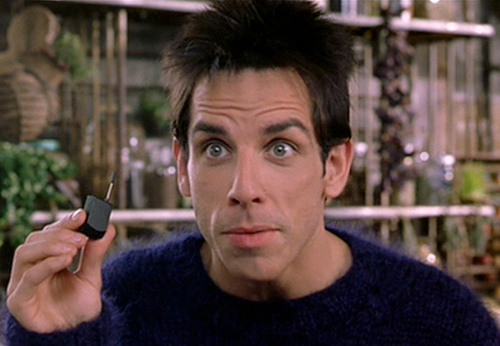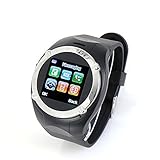
The BBC is reporting that the Government is so afraid of prisoners having access to concealed mobile phones, they want to introduce a ban.
UK officials are considering banning the sale of small mobile phones designed to resemble car key fobs.
A government spokesman told the BBC that it was discussing the issue with the National Trading Standards Board and the Serious Organised Crime Agency.
It follows a report by the Times suggesting some of the Chinese-made products were being advertised with prisoners in mind.
Having a mobile phone in jail is a criminal offence.
The article goes on to conflate a number of issues. As well as the illegality of having a phone in prison, there is the trading standards issue that some of these devices have unauthorised logos on them!
How exactly does one go about banning tiny phones? Two years ago, I reviewed the S16 watch phone. As the name suggests, it's small enough to comfortably fit on one's wrist.
A large percentage of the size is taken up by the touchscreen and the bulky battery. Since I reviewed it, sizes have shrunk dramatically - as have prices. You can now pick up a wrist worn phone for around £30.
 Now, all of the above are 2G phones. For 3G phones, there's the Micromax Modu. At around £50, it's a svelte 76 x 46.5 x 11 mm and features a reasonably competent Web browser.
Now, all of the above are 2G phones. For 3G phones, there's the Micromax Modu. At around £50, it's a svelte 76 x 46.5 x 11 mm and features a reasonably competent Web browser.
Is the Government really going to try to introduce a ban on technology under a certain size? Or technology which looks like some innocuous other item?
Or is this just some sabre rattling to make people thing "well, at least they're doing something!"

7 thoughts on “"Let's ban tiny phones!" - UK Government”
onetimeonly
I've been to jail in the UK. I served 4.5 months in B and C category prisons. Phones are so easy to get hold of, I don't think most people would believe it. During my time I emailed photos from inside the prison to friends outside using a smartphone. Approx. every other prisoner had a phone, and everyone had access.
The thing is, they weren't small phones. People didn't smuggle them in their colons - they used code systems to arrange for their friends to throw things over the fences in particular places. Mini-riots were organised to coincide with throwovers. Drugs get in the same way.
There were a whole lot of more inventive methods used too. Suffice it to say that the problem is not the size of phones. It's that if you deprive people of their freedom, they spend all their time thinking about how to get it back. They will eventually work out how to get a little piece. Tiny phones won't make the blindest bit of difference.
I'm curious about two things.
Firstly, how do you charge a phone? I wouldn't have thought cells had plug points.
Secondly, is there any realistic way of stopping phones getting in? Building higher fences, and putting sensors on them, sounds like one way of stopping throwovers for example.
T
onetimeonly
reply c/p from HN:
Cells in UK jails are not barren concrete-and-metal things like in the movies. They have a sink, a desk, a kettle, a TV, a (usually padded) chair and a bed. You charge your phone by plugging it in :).
Another fact many people don't know is that you can buy things, legally, in prison. By things, I mean pretty much anything in the Argos catalogue. You get an allowance of £10/week which you can save up. Some people had playstation 2s. Lots of people had stereo systems.
Many of the phones came without chargers, but people were very good at reworking electronics. I saw one system where someone had rewired the inside of his casette player to have two contacts so he could slot in his phone battery and it would charge when he pressed play, in a nicely hidden compartment.
I think there's not really any way of preventing smuggling. Like all systems of oppression, prisons stimulate people's desire for freedom. When you have 24 hours a day, 7 days a week, 365 days a year to think about a way to smuggle something in, and then you have 10k people in a prison, and people get transferred between prisons... eventually someone will come up with a way, and it will spread fast.
RC
Why not using a GSM jammer ?
GSM jammers are illegal in the UK. http://stakeholders.ofcom.org.uk/enforcement/spectrum-enforcement/jammers/
a. what about jamming phone signals in the prison? b. no disrespect, onetimeonly (and thanks for the really interesting insights!), but isn't the point of prison supposed to be that it's not a nice place to be, hence you are dis-incentivised from committing crimes? Maybe I've misunderstood. 🙂
So you could get put in prison for installing one ... in your prison. Ah the irony of modern life.